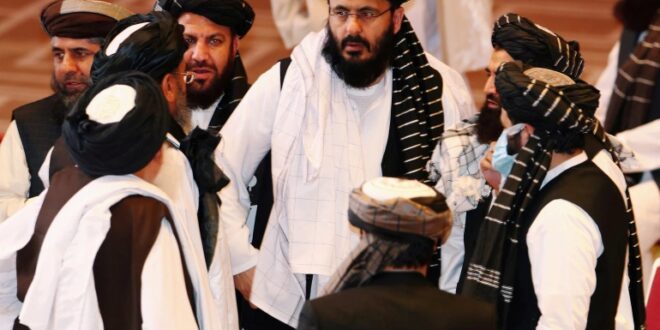The spokesman for the Afghan government’s negotiating team in Doha said the offer from the armed group was a ‘big demand’.
The Taliban have offered a three-month ceasefire in exchange for the release of thousands of fighters held in prisons, a top Afghan government negotiator said on Thursday, as the armed group seized control of a key border crossing with Pakistan.
Nader Nadery, the spokesman for the Afghan government’s negotiating team in the Qatari capital, Doha, said it was a “big demand”. Peace talks between Taliban and Afghan leadership in Doha have been stalled for months.
“The Taliban has offered a plan for a three-month ceasefire, but in exchange they have asked for the release of 7,000 of their prisoners and the removal of their leaders from the UN blacklist,” he told reporters in Kabul.
Last year, the Afghan government released almost 5,000 Taliban prisoners as part of an exchange that helped launch peace talks in Qatar. The measures were agreed as part of the Taliban-US agreement, which also called for the withdrawal of US forces from the country.
A spokesman for the Taliban said he was only aware of the suggestion of a ceasefire over the forthcoming Eid al-Adha holiday.
The Taliban is waging a relentless campaign across Afghanistan with the United States and NATO troops almost all but gone from the country, leaving Afghan forces facing crisis.
Fighters from the group captured the Spin Boldak-Chaman border crossing on Wednesday, the second most important crossing on the border with Pakistan and an important source of revenue for the Western-backed government in Kabul.
The Afghan armed group has in recent weeks also captured border crossings with Iran, Uzbekistan and Tajikistan. The group has been waging an armed rebellion since it was dislodged from power in a US-led invasion in 2001.
Pakistan’s foreign ministry confirmed on Thursday that the Afghan side of the Chaman border crossing was in the hands of the Taliban. The move prompted Pakistan to shut its side of the border.
“An unruly mob of about 400 people tried to cross the gate forcefully. They threw stones, which forced us to use tear gas,” said a security official on the Pakistan side, who asked not to be named, adding that the situation was later brought “under control”.
He said about 1,500 people had gathered at the border Wednesday waiting to cross.
The crossing provides direct access to Pakistan’s Balochistan province – where the Taliban’s top leadership has been based for decades.
Al Jazeera’s Kamal Hyder reporting from Peshawar, Pakistan said the “takeover of Spin Boldak came as a surprise”.
“A humanitarian crisis was beginning to unfold,” Hyder said.
“Tens of thousands of people [were] stranded on both sides. This is a very busy border, given the fact that most of the medical emergencies from Afghanistan cross to Pakistan because there are better medical facilities here, and also the fact that many families [were going to cross] to meet their relatives because Eid Holidays were approaching.”
On Thursday, the Afghan Taliban and the Pakistani government agreed to reopen the border crossing to allow stranded people through.
‘Ceasefire to consolidate power’
Islamabad on Thursday announced it had invited a number of “Afghan leaders” to a peace conference over the weekend, but an aide to Afghan President Ashraf Ghani told local media his government had asked for it to be postponed, with politicians already heading to Qatar.
Muska Dastageer, a lecturer at the American University of Afghanistan, said any Taliban ceasefire offer was likely an attempt by them to consolidate the positions they have gained so swiftly in recent weeks.
“A ceasefire now would effectively prohibit (Afghan forces) from retaking the crucial border points which Taliban have captured recently,” she tweeted.
“I think the timing of this ceasefire offer has more to do with their wish to consolidate power over these areas.”
 Eurasia Press & News
Eurasia Press & News




